Nina MacLaughlin's Blog, page 17
January 22, 2016
The four of us stood in front of the space under the...
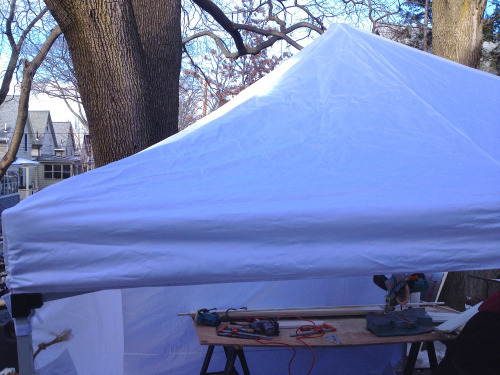
The four of us stood in front of the space under the windows
where the kitchen sink would live, M. and me and the couple we’re working for.
A decision had to be made: dishwasher to the right or left of the sink. A
simple choice, one of hundreds that take place in these sorts of renovations.
The couple pro’d and conned each side; the preferences of the primary dish-doer
had greater weight. On the right, it was decided. And so it was. M. and I
installed the cabs, slid the appliance into its slot, pulled open the door, and
looked at each other in silence. “No,” I said, trying to rejigger reality so
that what was happening wouldn’t happen. M. lay down on the floor. The handle of
the oven stuck out enough that it did not allow the door to the dishwasher door
to open all the way. “No,” I said again. M. continued to lie on the floor, her
hands over her eyes. This was a problem.
And there are always solutions. Some of which would’ve
involved dismantling several hours of work. We consulted with the owners, who
pro’d and conned their options again and decided to put the dishwasher on the
diagonal. Not ideal, not easy, but a solution. And it’s a funny thing being witness
to these domestic moments, these minor crises. A doctor opens up a patient and
a measuring error can mean a person might lose use of their legs. Here, the
stakes are lower, but we do what we can to manufacture meaning in the moments
anyway, the small dramas of space and how it’s filled. If you do dishes
everyday, load and unload, these decisions impact the way your life unfolds in
small but significant ways. Underestimate at your peril. Outside, we set up a
tent to cut the wind which blew in the single digits earlier in the week, a
little outdoor workshop pavilion. It felt festive, a tiny circus, a celebration,
a wedding, sawdust and cold planks of poplar instead of gowns and vows and
champagne.
January 9, 2016
We talk about the weather. We’ve worked outside all week,
with...
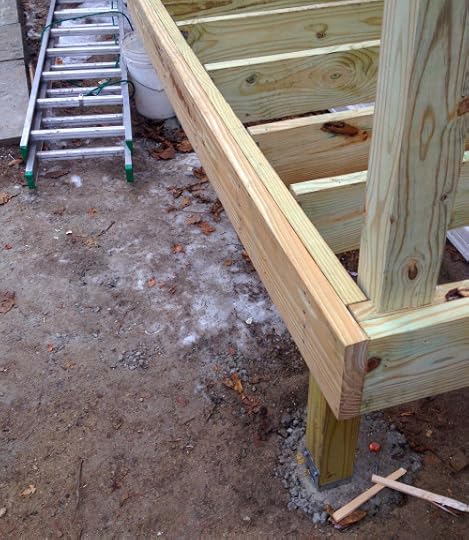
We talk about the weather. We’ve worked outside all week,
with temperatures between twenty-two and forty. We talk about the possibility
of snow or rain, of the thickness of the air, of the timing of sunrise and
sunset. ‘Feels a little colder,’ we’ll comment in the afternoon. ‘It’s the wind
that’ll get us today.’ ‘Tomorrow’s supposed to drop back down.’ It’s a
different interaction with the outside: aware of our fingers, our toes, of the
upped hurt of a banged thumb, of the diminished power of the battery-operated
tools, of the hazards of the ice patches on the ground in the small backyard. We
turn to watch squirrels chasing each other up a tree. We wonder what the pair
of birds are up in the branches, bigger than blue jays with brownish yellow
chests. The pair hangs out, flies off with the first scream of the skill saw
which struggles to move through the frozen planks of pressure treated wood. We
talk about how hungry we are when we get home in the dim late afternoon,
starving, ravenous, the body having burned all day to keep warm. Cheese, dried
meats, fat, protein. Replenishment, I am sated in some new way, one that goes
beyond calories, a more total sort of touching at the source. I wake in the
night and slip the covers off, my furnace self still cooking, heated and
heating. We’ve only ever built decks in warmer months, in shortsleeves,
sweating and getting freckled in the sun. Now, here, closing in on the middle
of January, soberest January, in thin light and cold air, we pound nails, and
find ourselves, under all our layers, warm.
January 5, 2016
For a certain amount of hours, the cold is okay if you have
on...

For a certain amount of hours, the cold is okay if you have
on enough clothes. Twenty-seven degrees yesterday in Cambridge and we were
working outside, roofing the addition we’d built. Big steamy plumes of breath,
snowflakes small and falling fast, a different view of the neighborhood from
thirteen feet above the ground, and hammerbangs echoing across backyards as we
shifted back and forth across the roof nailing sheets of shingles, layer after
layer.
Five shirts, a wool sweater, a down vest, a jacket, eight
total layers atop. Below, the leggings I run in, and over that, jeans. “Brought
something for you,” M. said in the morning. She pulled a pair of fleece-lined
pants from the back of the van. “Regular pants aren’t going to cut it today.”
She was right. There was an exhilaration to much of the day, a feeling of
urgency –
stop moving, get cold; keep moving, stay warm – and the good challenge of
being outside on an inhospitable afternoon, an enhanced sort of aliveness, of every
exhale witnessable, of trying to keep the creeping ache in the fingers tips at
bay, an exaggerated awareness of blood, body, and air.
Besides the fleece-lined pants, M. brought another surprise
with her to combat against the cold. From under an unused bale of insulation in
the back seat of the van, she pulled a crock pot out filled with stew and
plugged it into an extension cord which draped out a window and into the narrow
alley at the side of the house. While we worked, it heated, lamb stew she’d
made with peas, potatoes, rosemary. She brought styrofoam bowls and two spoons
and we sat in her van at lunch, a little later than usual to allow for the stew
to heat enough, and we got warm.
By three that afternoon, the cold crawled in and took hold.
Snot dripped from our noses, we clapped to warm our hands, swore more, talked
less. For all the clothes and the warm stew with delicious chunks of lamb, for
all the hammering and clambering up and down the ladders, the cold had its way,
and we surrendered, a little earlier than usual, and I walked home thinking how
this season pushes you differently, keeps you focused, sharp, and moving,
better for body, better for brain, and about how many ways it’s possible to find
warmth. I walked home feeling winter as a friend.
December 17, 2015
On the evening that my grandmother died earlier this month,
I got a voicemail from the mother of one...
On the evening that my grandmother died earlier this month,
I got a voicemail from the mother of one of my best friends. She called with
her love and condolences and it was good to hear her voice, a true comfort on a
sad day. It was a little after nine at night when I got the message; I didn’t
want to call back because I didn’t want to risk waking her. The fact was my
friend’s mother was in the hospital, the fact was she was dying. I texted back
with my thanks and love, told her we would talk soon, that I didn’t want to
wake her with a call. My phone started ringing almost immediately.
“You can call me anytime,” she said. “You never, never have
to worry about calling too late. I mean it.”
It was one of the kindest and most generous things she
could’ve said, embracing, maternal, so explicitly loving. The specific comfort
of knowing there is someone you can call at any hour, who says it and means it
and makes you know it every time they embrace you. This was her way – so
giving, so loving.
When we were young, my brothers and I referred to her as
Everybody’s Mother. It was a teasing reference – she was the type of
person who hugged you and remembered your birthday and was proud of the goals
you scored at soccer, and also someone who, if you misbehaved or talked back,
was not afraid of scolding, was not afraid of letting you know who was boss.
That evening earlier this month, we talked about my
grandmother for a few minutes as I walked down a drizzly street in Cambridge, and
I pictured this woman, this second mother to me, in a hospital bed a couple of
miles away, across the river in Boston. A second mother. I think there are so
many people who would describe her that way. She gathered people in under her
wings. She made people feel loved.
“I have one thing I’ve learned,” she said, “I have one thing
I want to tell you. There’s a way to keep people alive after they’re gone.
You’ve got to tell stories about them. Talk about them. Tell stories about your
grandmother. Tell people stories about her. That will keep her alive. Telling
stories keeps people alive.”
My friend’s mother died yesterday. And I will tell a small
story about her. We were talking about footwear for her daughter’s wedding,
this, a little over a year ago. We were in the woods on a porch of a small
cabin on Martha’s Vineyard overlooking Lake Tashmoo. She was a sailor, a woman
who taught classes on how to navigate by the stars. “I don’t like shoes,” she
said. “I’m a barefoot kind of girl myself.” It was one of the most wonderful
things, and my heart swelled to hear it, and I think of it often. How it spoke
to something essential about her, something spirited and youthful and strong.
And in thinking about her yesterday, a memory came rising
out of the distant past. At Wheelock Elementary School when we were young, in
what would now be considered an act of environmental violence, there was an
annual Balloon Day. Every child was given a balloon and a little tag to attach
to it with a note on it, like putting a message in a bottle, and all at once,
on a bright spring morning, every child released their balloons into the air,
hundreds and hundreds of balloons rising into the sky with notes attached from
kids hopeful that someone would find their tag when the balloon came to rest on
the earth again. And I see my friend’s mom there, she helped out in our third
grade classroom. I see her standing by the playground as all these hundreds and
hundreds of colorful balloons rose into the sky, and I see her put her arm
around my friend, her daughter, and they smiled for a picture together, and
then other kids got into the picture, and then more, Everybody’s Mother, and
the balloons got higher and higher and there were so many and they were so
colorful, and they floated gently off into the sky, off into infinity for a
while, to land with a note attached for someone to find, who could look at it
and read it and say to someone later, ‘hey, listen to this.’
December 14, 2015
We find things when we work. Behind walls, under floors, in
dark...
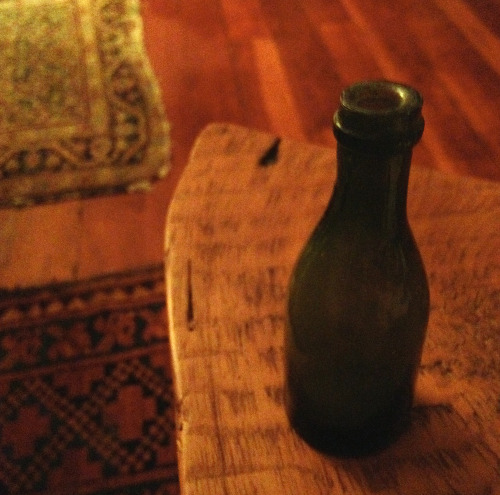
We find things when we work. Behind walls, under floors, in
dark bays, in the dirt below the house. Marbles, green plastic soldiers,
license plates, old tools. Once, an ice skate, childsize, laces tied in a neat
bow. Digging in the dirt below the basement in the house we’re working on, we
found glass bottles, a bent spoon, a shallow offwhite saucer, a rusted vice.
Who deposited this collection here, any why? No answers. I pocketed one bottle.
It’s simple, small, and green. “Demo guys found an active grenade from World
War II in the ceiling of the place we’re working on in JP on Friday,” said the
electrician this morning. “Bomb squad had to get called in. If it had fallen on
the floor? Boom.” It’s an unspoken rule that we leave the treasures we find for
the people who own the house. Of course I have treasuremap hopes, that one day,
peeling back a floorboard, we’ll find rubies, a sack of cash. And beyond that,
this powerful, driving sense that if you keep digging, keep getting deeper and
darker and wetter and weirder, something important will be unearthed. Something
big, something altogether altering, something explosive. Maybe. And maybe
there’s nothing but more darkness, a depthlessness that can swallow you right
up. I’ve shoveled so much recently, dug
in. It’s tiring. It’s dark down there and there’s no sign yet of a bottom.
November 23, 2015
The piece on the diagonal, it’s to brace against the...
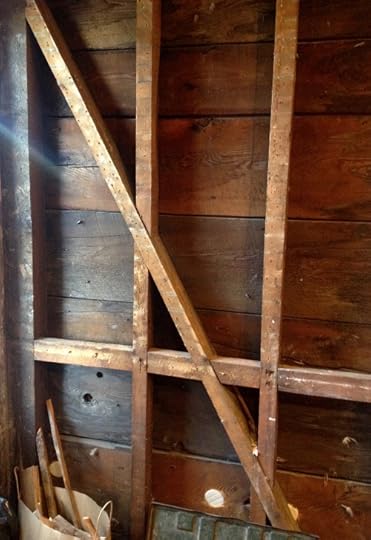
The piece on the diagonal, it’s to brace against the wind.
Strange to think that behind the walls, there’s wood doing work to keep your
home from blowing over. The winds were strong today, and cold. We worked
outside, framing new walls that will extend the one shown here. I didn’t wear
enough clothes and felt the first real cold of the season, a chill, an ache, a
giddy, shivery numbness of mind. It’s felt like November in all the right ways
these days, most of all between three-thirty and four-thirty in the afternoon
when the light is like no other light in all the year. Yesterday, the rain was
of autumn. Today, the wind was of winter. Over the weekend, at a friend’s
baby’s first birthday party, I had the good luck to have a conversation about
months with someone’s father; I like these conversations most of all. October
was his favorite. And from my informal poling, that seems to be most popular – high
fall, the eruption of color, the fading warmth, the first sweater. He talked
about the light, the golden light. I agreed it was great, and made an argument
for November’s magic dusks. “Yes,” he said. “Yes. There’s something electric in
that light, isn’t there.” He spoke about being on a drive last month, rounding
a corner on a road on an October afternoon, and mortality descended, a sudden
and full-force confrontation. It wasn’t terror, he said, or exhilaration, more
totality of fact. And something of October’s golden glow was of some comfort in
the face of it. “November, though,” he said, “November has claws.”
November 16, 2015
The initial stages of a project tend usually towards misery,
for...
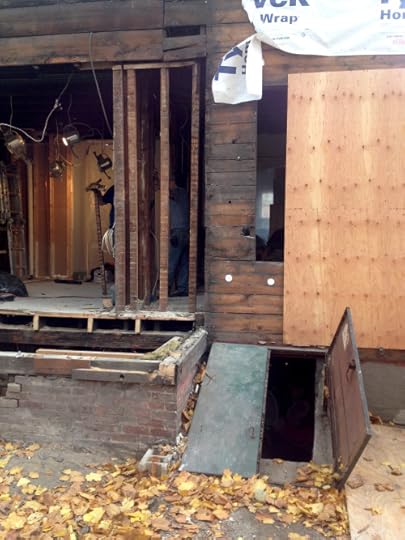
The initial stages of a project tend usually towards misery,
for me at least. The start involves the dirtiest and most tedious parts. The dismantling
before the building. We started work ten days ago on a big job, maybe our
biggest to date. A new kitchen, a new dining room, and an extension by about
four-and-a-half feet off the back of a house on a north Cambridge side street.
It’s a small house, and there’s a third baby on the way; the sense is every
square inch helps. So far, it’s been hole-digging, cement-pouring,
column-securing, and beam-placing, readying the space for new walls, new
weight. These are the days when the project seems unfinishable, when it is
impossible to imagine walls, counters, windows, doors. When we sit on
the subfloor as we eat lunch and listen to the big blue tarp thwap in the November
wind. Lunch breaks are shorter because if we sit too long, the chill takes
hold. I haven’t learned yet how to have a better attitude about beginnings. There
is something frightening in them. As much as I tell myself that all the Humpty-Dumpty
pieces will be put together, it doesn’t feel that way. Just hard dumb labor and
damage. So it starts. And my lament will shift, I know, but right now, I can’t
sing about the glory or satisfaction. It is grind and I am tired.
November 10, 2015
The girl stood on the sidewalk of Paseo de la Reforma, a
broad...
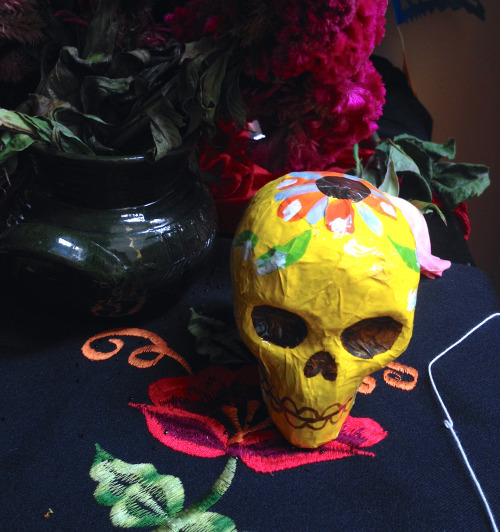
The girl stood on the sidewalk of Paseo de la Reforma, a
broad boulevard that runs at a diagonal across Mexico City. She was thirteen,
eleven, full cheeked, breastlettes just beginning to push at her dress. Her
mother sat on a bench nearby with a kid in her arms. The girl’s face was
painted for Day of the Dead, dark hollows around the eyes, toothy smile on the
mouth. Her dress was bridal white, part of the costume, and it had splatters of
stage blood on it. The girl twirled on the sidewalk. Her skirts billowed. She
twirled and I remembered what it was to be a girl in a long skirt and spinning
to feel it billow. I had forgotten. I had forgotten all about spinning to make
your skirts blossom below you. Oh, she was pleased with herself. She loved the
way she looked! Dressed up, face painted, her fancy bridal gown blood
splattered. A special day. She spun, stopped, smiled, looked at her mom and her
brother on the bench to see if they’d seen what she was. They didn’t care. Stage
blood stained the chest of her dress, a red slash, and lower. My eyes fell to
her waist, and lower, blood there, not a slash but a rounder red seep, an
almost floral spread, and it looked menstrual, or more, this virgin bride, that
tearing, and it spoke violation, violence. She spun again, slower this time,
the skirts bloomed below her. What did she feel like? A dancer? A princess? An
angel? A woman?
November 3, 2015
I am in Mexico City right now. I came here alone. I have
walked...

I am in Mexico City right now. I came here alone. I have
walked and walked. And in trying to think of a dispatch, a summing up, in
trying to organize what these last few days have been, I have a hard time
finding the boundaries, knowing what to say or how to put it into words yet.
That’s fine. To be in a new place is one way of finding a center, of pressing
reset, these vague and hard to articulate mind-shifts. And maybe worthless to
articulate. When I think about what to say, I come to this cloud of impressions
and inarticulatables, and then I keep coming back to my boots.
Do you get this way with shoes? Do they become your friends?
I am not someone who owns a lot of footwear. I’ve had this pair for nine years,
maybe ten. I bought them as a present to myself after getting a promotion at my
job. They have taken me places. They’ve been with me for so many steps.
Yesterday, I walked a little over ten miles, on unfamiliar streets in a city I
don’t know. I had a destination, an easy route. It still took a while. I got
blisters. Mean, purple-red swells that kept me awake last night throbbing. I
wasn’t angry at the boots; they did their job. And sometimes it’s good to feel
the impact of a walk. I feel it in my bones today, too. And the muscles in my
calves.
There have been skeletons and marigolds and good smells and
big noises. I’ve been euphoric, moved, so sensorily overloaded, nervous,
lonely, tired, glad. For now, this grounding, these boots, every step a
thinning sole, but so sturdy still.
Day After Day of the Dead
by Nathaniel Mackey
“While we’re alive,” we kept
repeating. Tongues, throats,
roofs of our mouths bone dry,
skeletons we’d someday
be…
Panicky masks we wore for
effect more than effect,
more real than we’d admit…
No longer wanting to know
what soul was, happy to
see
shadow, know touch…
Happy to have sun at our
backs, way led by shadow,
happy to have bodies, block
light…
Afternoon sun lighting leaf,
glint of glass, no matter what,
about to be out of body it
seemed…
Soon to be shadowless we thought,
said we thought, not to be offguard,
caught out. Gray morning we
meant
to be done with, requiem so
sweet we forgot what it lamented,
teeth
turning to sugar, we
grinned
•
Day after day of the dead we were
desperate. Dark what the night
before we saw lit, bones we’d
eventually be… At day’s end a
new
tally but there it was, barely
begun,
rock the clock tower let go of,
iridescent headstone, moment’s
rebuff… Soul, we saw, said we
saw,
invisible imprint. No one wanted to
know
what soul was… Day after day of
the dead we were deaf, numb to
what the night before we said moved
us,
fey light’s coded locale… I fell away,
we momentarily gone, deaf but to
brass’s obsequy, low brass’s
croon begun. I fell away, not fast,
floated,
momentary mention an accord
with the wind, day after day of the dead
the same as day before day of
the dead… “No surprise,” I fell away
muttering, knew no one would
hear,
not even
me
•
We wore capes under which we
were in sweaters out at the elbow.
Arms on the table, we chewed our
spoons…
Mouthing the blues, moaned an
abstract truth, kept eating. The
dead’s morning-after buffet
someone said it was. Feast of
the
unfed said someone else… What
were we doing there the exegete
kept asking, adamant, uninvited,
morose…
Elbows in the air like wings, we
kept eating, rolled our eyes,
kept
shoveling it in… Day after day
of the dead we were them. We
ate inexhaustibly, ate what wasn’t
there,
dead no longer dying of thirst,
hung over, turned our noses up
to
what
was
________________
It was me, we were it, insensate,
sugared sweat what what we drank
tasted like. Even so, the tips of
our
tongues tasted nothing, we sipped
without wincing… We ate cakes,
we
ate fingernail soup, a new kind of
gazpacho, no one willing to say
what soul was… Knucklebone
soufflé we ate, we ate gristle, eyes
we
took from flies flying backward
a kind of caviar, none of us wanting
to say
what soul
was



